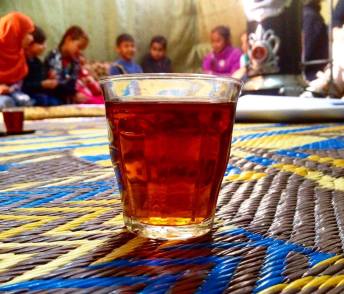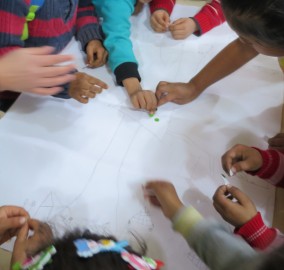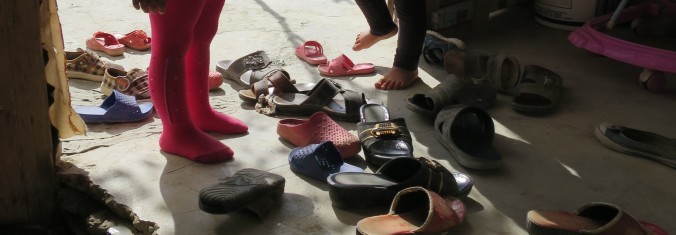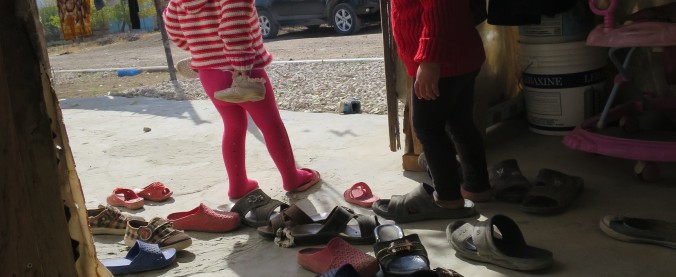“They work from 6am to 3pm in agriculture and take $3 a day. They are too tired, they are working too hard. A child doesn’t have the capacity for this, but he has to do it.”
“We have to be strong in front of our children, to let them feel strong. Maybe we don’t have enough support but we have to pretend.”
It’s somehow surreal to be spending my days hearing stories like this of a reality I can’t really comprehend which breaks my heart again and again – at the same time as the rest of the world also seems to be turned upside down in a very different way.
 These conversations with Syrian children and families feel very far removed from the world of facebook arguments and article sharing justifying votes and views; and yet at the same time, these people and these conversations are in some way right at the centre of it all. Because here is where I meet the theoretical ‘other’ face to face – the family from Raqqa with a faith different to mine, the teenage boys from Aleppo who dream of a life with more opportunity – as they laugh, are listened to, and drink a cup of tea with me.
These conversations with Syrian children and families feel very far removed from the world of facebook arguments and article sharing justifying votes and views; and yet at the same time, these people and these conversations are in some way right at the centre of it all. Because here is where I meet the theoretical ‘other’ face to face – the family from Raqqa with a faith different to mine, the teenage boys from Aleppo who dream of a life with more opportunity – as they laugh, are listened to, and drink a cup of tea with me.
In this current project, with this one community, we’re trying to listen and learn together about the ways that these children are not safe and how together we could make them safer. More than ever I am recognising these people as just that – people – not ‘refugees’ but a community, individuals with stories, neighbours.
I love to share stories of how the church in Lebanon is acting and working to change the situation of those who have fled war in Syria – and undoubtedly they are, and they’re in it for the long term.
But it’s not easy.
The reality is that they do this amidst a sea of intractable and seemingly insoluble problems; among these, a registration system which prevents most Syrians from having legal refugee status, making life constantly insecure and rooted in well-founded fear; and an inescapable lack of money which means families increasingly use coping strategies like sending children to work, removing them from school or accumulating increasing debt. This is a complicated story, and we somehow live and work amidst the tangled knots.

And as I’m thinking about this, we suddenly arrive at one of the settlements. Way past the edge of town, past the vineyards and agricultural fields, past brick factories and through clouds of dust. And out of sight amidst the piles of blocks and stones, brown earth and grey air, a cluster of tent and brick homes and children, outside, playing with pieces of cement and stone.
Like the rows and rows of bricks piled neatly one upon the other are the challenges and apparent hopelessness of the child’s world who lives here –the child who must be growing up knowing only brick and dust – can anything really change this?
And in the same way, there is so much that needs to change from the top down for things to really be different – for war to end, for justice to be done, for resources to be shared, for the most vulnerable to be seen and valued.
While this doesn’t happen, the losses continue: today bombing restarts in Aleppo, and so it continues. More children will die, and I don’t think anything will happen to stop it. For one group of children we spoke to this week, children who have lost someone in their family was the most serious problem they identified.
And yet, in these communities beyond anywhere, on the edge, the church we’re partnering with is including these children, who no one else has cared about, in their education project – they’re going to school when they weren’t before.
 I struggle to imagine how the church members first decided to come out here, to overcome fears and give up comfort, to make contact with people so apparently not like them, to talk and to listen.
I struggle to imagine how the church members first decided to come out here, to overcome fears and give up comfort, to make contact with people so apparently not like them, to talk and to listen.
And as children listen seriously and share ideas with wisdom and kindness, I recognise the deep privilege it is to be here.
Later on this week we’ll have a meeting to present all the information and ideas that have been shared and to try to decide together on ideas for projects we could develop together for children.
I’m under no illusion that there’s huge potential for miscommunication and misunderstanding, and that faithfully listening and acting and matching resources to dreams and hopes is far from a simple thing.
But whether or not it ‘works’, I’m glad to be trying. Despite all the things that seem impossible, wrong, and incomprehensible, I’m glad we have this chance to put on our shoes and take some steps together.


So, even though perhaps it seems that the bricks are piled especially high at the moment, as well as grieving and seeking for justice on a higher level, let’s also put our shoes on, go, listen, understand – and who knows, maybe we can be part of building something totally different together that we haven’t yet imagined.
Well done Kezia for doing what you are – you and your church colleagues. Your paragraph beginning “But whether or not it ‘works’…” sums it all up for me and brought tears to my eyes. Thank you for letting us share your shoes in Lebanon. David.
On 15 November 2016 at 20:29, kezia here and there wrote:
> kezia posted: ““They work from 6am to 3pm in agriculture and take $3 a > day. They are too tired, they are working too hard. A child doesn’t have > the capacity for this, but he has to do it.” “We have to be strong in front > of our children, to let them feel strong. Maybe w” >
LikeLike
Thanks David! And thanks for being alongside on the journey for such a long time.
LikeLike